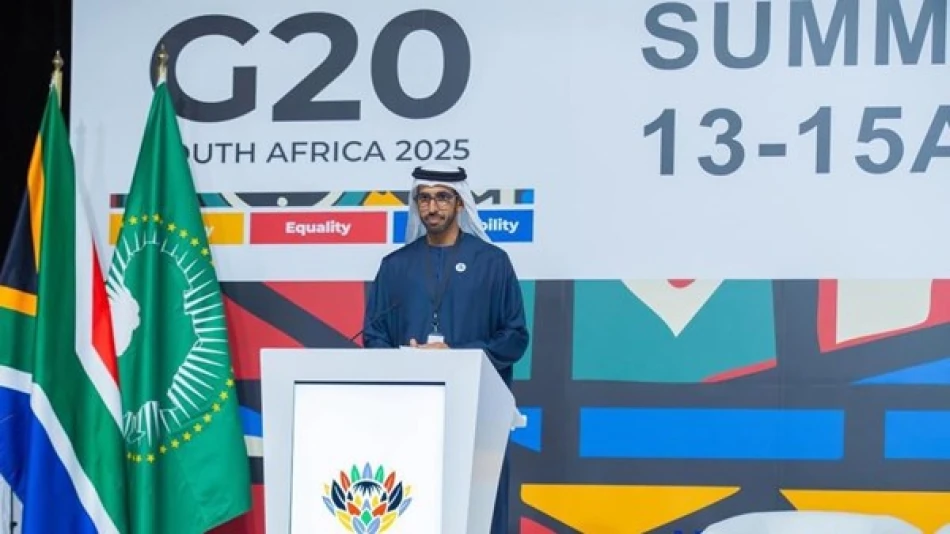
UAE Accelerates Water Investments in Africa, Boosts Sustainable Development
UAE Emerges as Global Water Security Champion with Major African Investment Push
The United Arab Emirates is positioning itself as a pivotal player in addressing Africa's water crisis, leveraging its upcoming role as co-host of the 2026 UN Water Conference to drive billions in climate-resilient water infrastructure investments across the continent. The strategic move signals the Gulf nation's broader ambition to become a global leader in sustainable development financing while securing its own long-term resource security interests.
Strategic Diplomacy Meets Development Finance
At the Africa Water Investment Summit held in Cape Town from August 13-15, UAE Minister of State Sheikh Shakhbut bin Nahyan Al Nahyan represented President Sheikh Mohamed bin Zayed Al Nahyan in high-level discussions with international leaders. The summit, organized under South Africa's G20 presidency alongside the African Union Commission and continental water investment programs, brought together decision-makers to mobilize funding for climate-resilient water and sanitation projects.
The UAE's participation wasn't merely ceremonial. Sheikh Shakhbut articulated a clear strategic vision: "Investment in Africa's water security is an investment in global stability, prosperity, and shared climate goals." This framing positions water infrastructure as a geopolitical imperative rather than traditional development aid.
Building on Zayed's Legacy with Modern Scale
The UAE's water diplomacy draws legitimacy from its founding father's humanitarian work, but the scale has transformed dramatically. While Sheikh Zayed bin Sultan Al Nahyan focused on localized clean water projects, today's approach involves systematic technology transfer and large-scale infrastructure development.
The Mohammed bin Zayed Water Initiative
Launched in February 2024, this initiative represents the UAE's most ambitious water security program to date. Unlike traditional aid models, it emphasizes innovative and advanced technologies to address global water scarcity—likely including the UAE's world-leading desalination expertise and renewable energy integration capabilities.
For international investors, this signals potential opportunities in public-private partnerships combining UAE capital with cutting-edge water technologies, particularly in solar-powered desalination and water recycling systems.
Recognition and Strategic Positioning
The UAE received the "Global Water Changemaker" award from Botswana President Duma Boko, specifically recognizing its role as co-host of the 2026 UN Water Conference. This award carries significant diplomatic weight, as it positions the UAE alongside other global leaders demonstrating commitment to climate-resilient water investments.
The timing is strategic. With the UN member states unanimously adopting six interactive dialogue themes for the 2026 conference—including a specific focus on water investment—the UAE is establishing itself as the convening power for global water finance discussions.
Market Implications and Investment Opportunities
The UAE's approach differs markedly from traditional development finance models. Rather than purely grant-based assistance, the emphasis on "investment" suggests commercially viable projects that can attract private capital alongside government funding.
Comparative Advantage
Unlike other major donors, the UAE brings unique technical expertise from managing water security in one of the world's most arid regions. The country produces nearly 4 billion cubic meters of desalinated water annually and has pioneered renewable energy integration in water production—technologies directly applicable to Africa's challenges.
This positions UAE companies and sovereign wealth funds to capture significant market share in Africa's estimated $30 billion annual water infrastructure investment gap, while supporting the country's economic diversification goals.
Geopolitical Water Diplomacy
The UAE's water security focus aligns with broader trends among Gulf states seeking to expand soft power influence in Africa. However, the technical expertise component provides more sustainable engagement than purely financial relationships.
For African governments, UAE partnership offers access to proven water technologies without the complex political conditions often attached to Western development finance. The 2026 UN Water Conference will likely showcase these partnerships as models for South-South cooperation in addressing climate adaptation challenges.
The summit's outcome—bringing over 1,000 stakeholders together to identify concrete water financing results—suggests the UAE is building a substantial coalition ahead of 2026, positioning itself as the indispensable convener for global water security discussions.
Most Viewed News

 Layla Al Mansoori
Layla Al Mansoori






